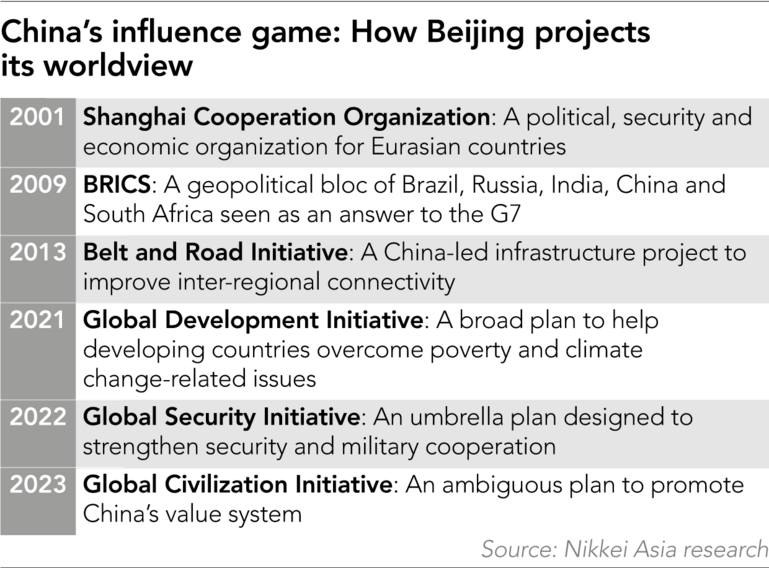‘Xivilization’ – China’s authoritarian answer to crisis: At first glance, China's Global Civilization Initiative (GCI) may appear to be simply the latest iteration of what the National Endowment for Democracy’s International Forum calls China’s sharp power. But it is "more sophisticated. It’s more strategic, more long-term oriented,” said Moritz Rudolf, a research fellow at Yale Law School’s Paul Tsai China Center.
China targets sea change in global diplomacy race with West
As Blinken calls, Beijing wields 'Xivilization' to promote China worldview
Nikkei Asia,
https://asia.nikkei.com/Spotlight/Asia-Insight/China-targets-sea-change-in-global-diplomacy-race-with-West
HONG KONG -- For three years, COVID kept China's global diplomacy goals on ice. Now, with the U.S. enmeshed in a domestic election campaign and the international community preoccupied with war in Ukraine, Beijing is back, ramping up a drive to promote its own alternative to the West's "rules-based international order."
From offering to foster Palestinian-Israel relations, to floating peace proposals for Ukraine, President Xi Jinping, China's most powerful leader since Mao Zedong, has stepped up his global influence game amid soured ties with the U.S.
While Antony Blinken met the Chinese leader on Monday during the first trip to Beijing by a U.S. Secretary of State for five years, in recent months Xi has rolled out the red carpet in Beijing for leaders like Brazil's Luiz Inacio Lula da Silva, France's Emmanuel Macron and the heads of several Central Asian countries.
All this has come against a backdrop of growing tension over Taiwan, the democratic island claimed by China as its own: last week Xi hosted Honduran President Xiomara Castro for an embassy opening after her country broke off ties with Taipei. At the same time, China has launched the Global Civilization Initiative (GCI) -- the last of a trio of Xi's ideological frameworks -- as being central to "cultivating the garden of world civilization," or "Xivilization" as state media have termed it.
Opaque in language, Xi's initiative advocates for "common aspirations" of humanity, pitching a message that says, "Join our club, we won't tell you what to do -- unlike the West." But scholars say collegiality will come at the expense of human rights protections.
Compared to how China has acted in the past, "It's more sophisticated. It's more strategic, more long-term oriented," said Moritz Rudolf, a researcher and fellow at Yale Law School's Paul Tsai China Center. "It's a vision that China's putting out on the table, while Western countries are currently in a sort of an identity crisis, figuring out how to deal with a lot of challenges ... in a complex world.
"And then China just has an authoritarian answer to this."
China's vision of reshaping global norms has long been laid out but without much detail. First came the Global Development Initiative in 2021, a large pool of cooperative projects aimed at assisting developing countries reeling from COVID, the impacts of climate change and poverty. The Global Security Initiative came last year, two months after Russia invaded Ukraine.
Now with the GCI, Beijing is fleshing out its foreign policy by creating alternative institutions for global cooperation that are more ambitious than ever -- ringing alarm bells for some.
Unveiling the GCI in a speech earlier this year, Xi made at least one aspect clear -- no one should tell China what to do. "Countries need to keep an open mind in appreciating the perceptions of values by different civilizations and refrain from imposing their own values or models on others and from stoking ideological confrontation," he said, speaking to senior international political figures in a videoconference in March.
Malaysian Prime Minister Anwar Ibrahim remains the only national leader to publicly support the GCI. Some observers say not all Asian countries would subscribe to the initiative given the delicate balance of maintaining ties with the U.S.
But should Western nations continue to frame the competing agendas as "autocracy versus democracy" -- as U.S. President Joe Biden has described it -- that could help China's cause, some analysts warn.
In Southeast Asian countries, "At the political level there is a lot of alignment actually with the Chinese," said Hoang Thi Ha, senior fellow and co-coordinator of the Regional Strategic and Political Studies Programme at the Singapore-based ISEAS-Yusof Ishak Institute.
"The idea of 'Don't just use values such as liberal Western values to dictate your foreign policy with us'" carries weight in some capitals, Hoang said.



